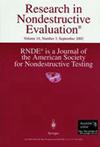基于Antlion优化算法的特征加权与选择同步的广义分类框架
IF 1.6
4区 材料科学
Q3 MATERIALS SCIENCE, CHARACTERIZATION & TESTING
引用次数: 0
摘要
在大规模无损评估(NDE)数据上使用基于机器学习的算法,极大地推动了无损评估技术向完全工业自动化的方向发展。本文在磁巴克豪森发射(MBE)数据集上同时进行特征选择和特征加权,以证明优化在NDE数据中的重要性。采用Antlion优化作为一种搜索方法来确定使分类性能最大化的最优特征集。在不同的磁化频率下分别对所提出的框架进行了验证,发现该框架与频率无关。该框架从MBE响应中选择了四个重要特征,从而减少了计算量,并将AdaBoost分类器的准确率提高到98.4%。开发的机器学习方法是处理工业感官数据的潜在策略,因为材料测试,性能预测和分类是制造和生产工程行业的常见任务。此外,本研究还证明了在面向工业革命4.0的无损检测自动化中嵌入智能的必要性。本文章由计算机程序翻译,如有差异,请以英文原文为准。
A Generalized Classification Framework with Simultaneous Feature Weighting and Selection Using Antlion Optimization Algorithm
ABSTRACT The use of machine-learning based algorithms on a large-scale nondestructive evaluation (NDE) data considerably advances the NDE techniques toward complete industrial automation. In this article, simultaneous feature selection and feature weighting are carried out on the magnetic Barkhausen emission (MBE) dataset to demonstrate the significance of optimization in NDE data. Antlion optimization is employed as a searching method to determine the optimum feature set that will maximize the classification performance. The proposed framework is validated for different magnetization frequencies separately and found to be frequency independent. The framework resulted in the selection of four significant features extracted from the MBE response thereby reducing the computational effort and improving the accuracy to 98.4% for AdaBoost classifier. The developed machine learning methodology is a potential strategy for processing industrial sensory data since material testing, property prediction, and categorization are frequent tasks in manufacturing and production engineering industries. Further, this research demonstrated the necessity of embedded intelligence in automation of NDE toward Industrial Revolution 4.0.
求助全文
通过发布文献求助,成功后即可免费获取论文全文。
去求助
来源期刊

Research in Nondestructive Evaluation
工程技术-材料科学:表征与测试
CiteScore
2.30
自引率
0.00%
发文量
14
审稿时长
>12 weeks
期刊介绍:
Research in Nondestructive Evaluation® is the archival research journal of the American Society for Nondestructive Testing, Inc. RNDE® contains the results of original research in all areas of nondestructive evaluation (NDE). The journal covers experimental and theoretical investigations dealing with the scientific and engineering bases of NDE, its measurement and methodology, and a wide range of applications to materials and structures that relate to the entire life cycle, from manufacture to use and retirement.
Illustrative topics include advances in the underlying science of acoustic, thermal, electrical, magnetic, optical and ionizing radiation techniques and their applications to NDE problems. These problems include the nondestructive characterization of a wide variety of material properties and their degradation in service, nonintrusive sensors for monitoring manufacturing and materials processes, new techniques and combinations of techniques for detecting and characterizing hidden discontinuities and distributed damage in materials, standardization concepts and quantitative approaches for advanced NDE techniques, and long-term continuous monitoring of structures and assemblies. Of particular interest is research which elucidates how to evaluate the effects of imperfect material condition, as quantified by nondestructive measurement, on the functional performance.
 求助内容:
求助内容: 应助结果提醒方式:
应助结果提醒方式:


